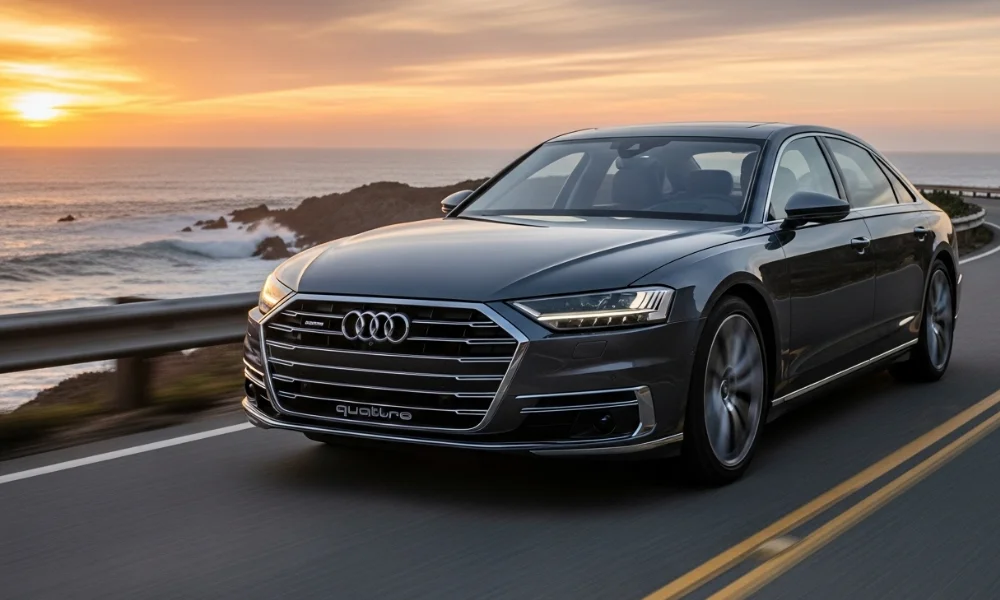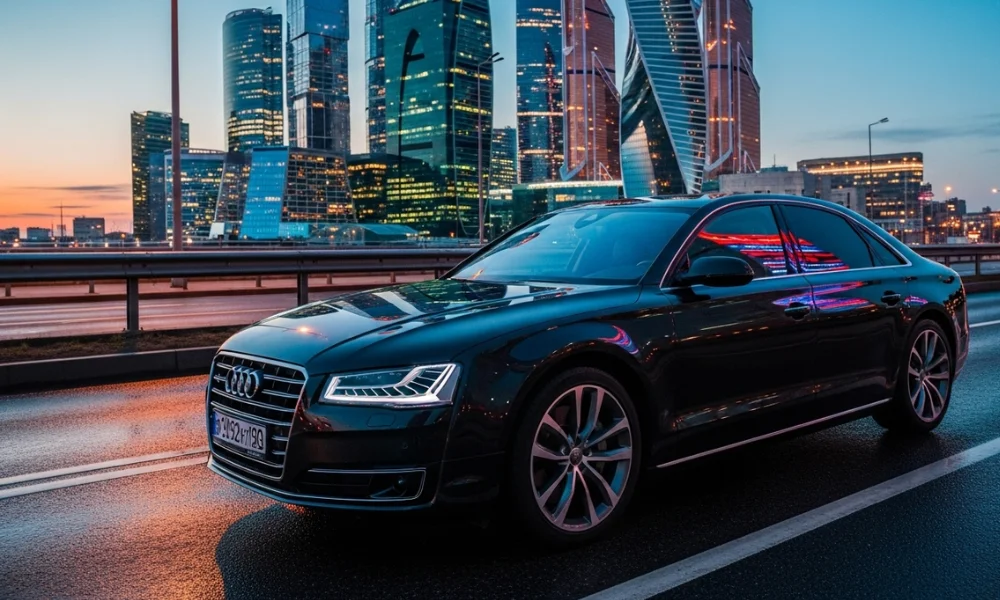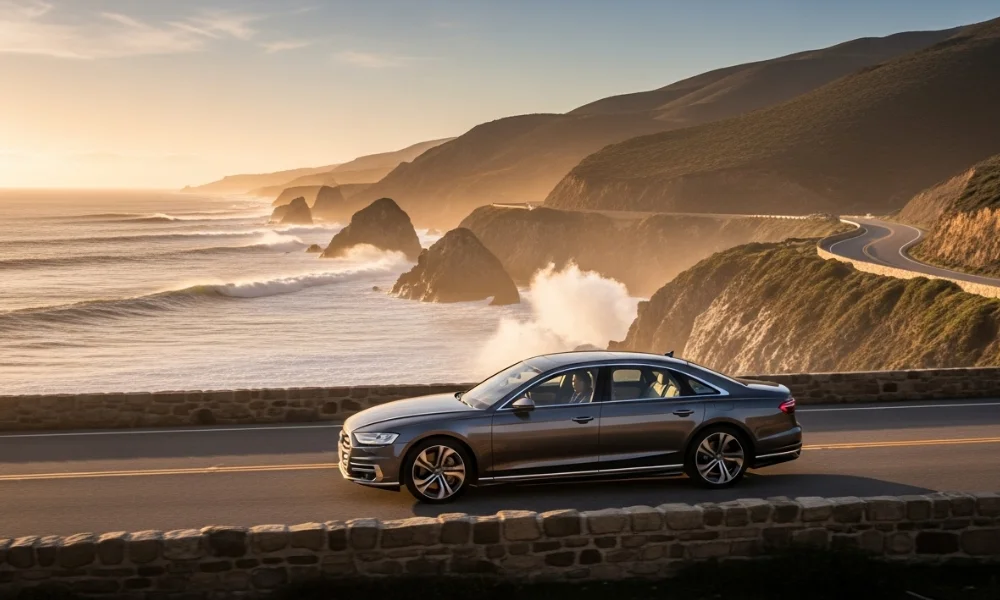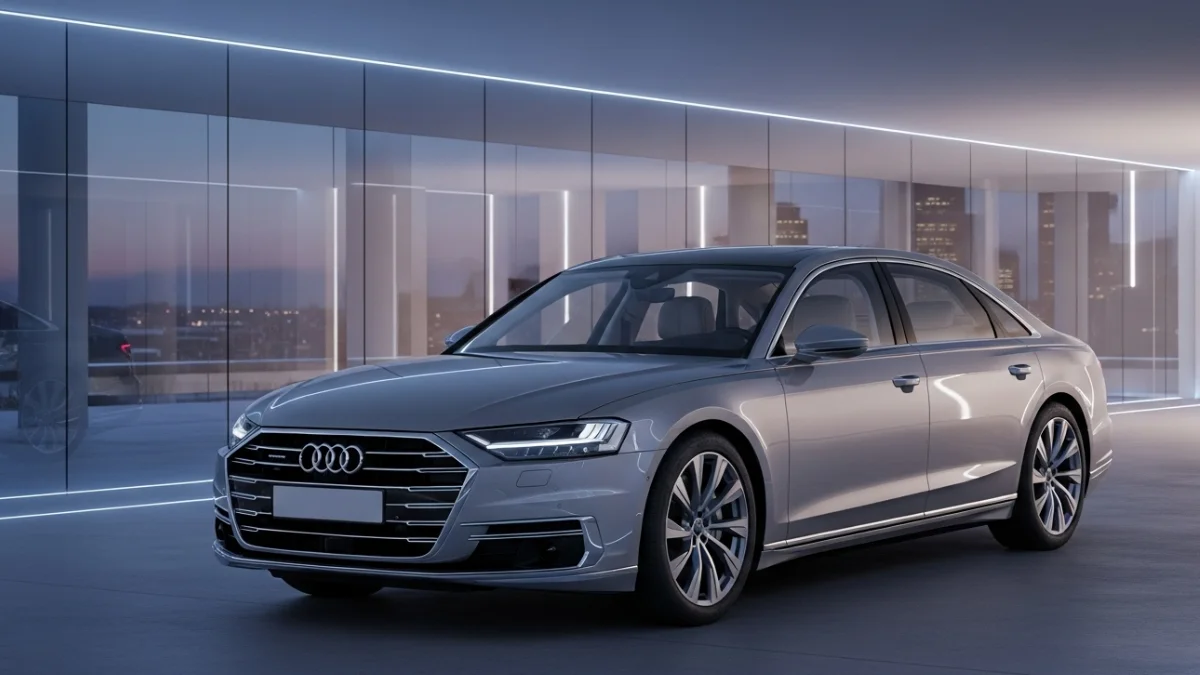Many people wonder if Audi is a luxury car or just a premium badge. This question pops up when comparing BMW, Mercedes, or Lexus for style and comfort. In this article, we’ll explain what makes a car truly luxurious. We’ll also see how Audi fits those standards and where it stands.
What Defines a Luxury Car or Luxury Brand?

A luxury car is more than an expensive vehicle with a nice badge. It combines price, materials, advanced technology, and brand prestige into a refined experience. Knowing these factors helps people determine if Audi truly fits the definition of a luxury car. It also sets a clear standard for comparing different automakers.
Price and Market Position
Price is often the first thing buyers notice when shopping for a car. Luxury brands like Audi, Mercedes, and BMW use higher pricing to show exclusivity and quality. This indicates that the car offers more than mainstream vehicles in terms of features and prestige. A higher price also suggests better craftsmanship and innovation inside.
Materials, Craftsmanship, and Interior Quality
Luxury cars stand out due to their refined interiors and meticulous details. Audi utilizes premium leather, soft-touch plastics, and advanced soundproofing across most of its models. These touches make even long drives feel comfortable, showcasing Audi’s commitment to quality. They also help Audi compete with other top luxury brands globally.
Performance, Engineering, and Technology
Performance is a key part of what makes a car truly luxurious. Audi’s turbo engines and quattro all-wheel drive deliver smooth power and secure handling. Innovative tech, such as the Virtual Cockpit, helps drivers feel they are in a high-end machine. These features demonstrate why Audi sits alongside BMW and Mercedes.
Brand Prestige, Exclusivity, and Perception
Brand image plays a huge role in how people view a car. Audi markets itself as modern and exclusive, positioning itself alongside Mercedes and BMW in the luxury segment. This prestige helps explain why buyers ask if Audi is a luxury car before making a purchase. Strong branding creates loyalty and a sense of pride for owners.
Cost of Ownership and Resale Value
Luxury ownership also means higher servicing and insurance costs. Audi generally sits between BMW and Lexus in terms of resale value and maintenance costs. Many owners believe the added expense is worthwhile for the status and driving experience. This balance makes Audi attractive for long-term luxury ownership.
Audi’s Brand Identity and Market Position
Audi has grown from a small European maker into a respected global luxury brand. It belongs to the Volkswagen Group but plays the premium-luxury role within the family. This position lets Audi compete directly with BMW and Mercedes in major markets. It also offers buyers a blend of advanced technology and refined design.
Audi’s Heritage and Brand Mission
Audi’s story began with a focus on engineering excellence and innovation. Its famous slogan “Vorsprung durch Technik” highlights a promise of advancement through technology. This mission shapes the company’s approach to building cars that feel truly luxurious. This is why Audi continues to invest in new ideas for drivers.
Audi’s Classification Within Volkswagen Group
Within the Volkswagen Group, Audi is positioned above VW and Skoda, but below Bentley and Lamborghini. This makes it the bridge between premium and ultra-luxury segments worldwide. Buyers see Audi as an accessible path to refined design and advanced features. It fills the gap between mass market and elite brands.
How Audi Positions Itself Versus Mass-Market and Luxury
Audi markets itself as a modern alternative to classic luxury brands. It blends cutting-edge tech, minimalist design, and strong performance to stand out. This strategy helps it answer the question “is Audi a luxury car?” with confidence. It offers customers a fresh take on premium luxury driving.
Does Audi Meet the Luxury Criteria?

Audi offers a wide lineup that stretches from entry-level to flagship models. Many of its cars meet strict luxury standards, while some sit closer to premium. Looking at features, technology, and performance shows where Audi clearly delivers the luxury promise. This helps buyers understand what they’re paying for in each segment.
Interior Materials, Amenities and Craftsmanship in Audi Models
Audi cabins are known for elegant design, soft surfaces, and intuitive infotainment. Even base trims feel refined with quality plastics and sleek layouts. Higher models bring fine leather, wood, and aluminum that reflect true luxury craftsmanship. This approach helps Audi compete with other high-end carmakers globally.
Performance, Engine Tech, and Driving Dynamics
Audi engines strike a balance between smooth power and efficiency, thanks to advanced engineering. Quattro all-wheel drive enhances grip and stability on various road conditions. S and RS variants push performance into high-luxury territory for enthusiasts. These elements show why many consider Audi a luxury brand.
Technology, Safety Features and Upgrades
Audi pioneered high-tech features like the Virtual Cockpit and matrix LED lights. These innovations give drivers a futuristic feel that rivals top luxury brands. Safety and driver-assist tools also reflect high-end engineering standards. They make Audi vehicles safer and more comfortable on long journeys.
Price Spectrum: Entry-Level to Flagship
Audi pricing starts in the premium zone but climbs into full luxury territory. An A3 may compete with high-end mainstream cars, but an A8 matches a Mercedes S-Class. This shows Audi straddling the premium and luxury segments worldwide. It lets different buyers find the right level of prestige.
Cost of Ownership, Maintenance, and Resale
Owning an Audi costs more than a regular car but less than ultra-luxury brands. Maintenance and parts are higher-priced, but this is offset by the vehicle’s good resale value. Many buyers find this balance attractive when seeking a luxury experience. It makes Audi a practical choice in the luxury segment.
Audi vs Other Luxury Automakers
Audi competes directly with Mercedes-Benz, BMW, Lexus, and other aspirational brands. Each has unique strengths and a distinct appeal for luxury buyers worldwide. Comparing these automakers shows where Audi stands in terms of technology, design, and performance. This helps shoppers decide which brand best fits their lifestyle and image.
Audi vs Mercedes-Benz
Mercedes places a strong emphasis on comfort, tradition, and prestige in its cars. Audi mixes cutting-edge technology, minimalist design, and sporty handling to stand apart. This balance attracts buyers who seek a modern twist on luxury rather than traditional classic opulence. It positions Audi as a progressive alternative in the segment.
Audi vs BMW
BMW is famous for its “ultimate driving machine” performance heritage. Audi responds with quattro AWD, sleek interiors, and advanced digital features. This combination appeals to tech-savvy drivers who still crave a dynamic driving experience. It gives Audi a clear edge with innovation-minded customers.
Audi vs Lexus and Other Aspirational Brands
Lexus builds its reputation on reliability and smoothness, rather than sporty character. Audi focuses on cutting-edge technology and European design to stand out. Other brands, such as Volvo or Genesis, chase similar customers but offer different mixes of value and luxury. This diversity keeps the segment competitive and exciting.
Which Audi Models Count as “Luxury”?
Not every Audi sits at the same level of luxury. Some models clearly compete with flagship sedans, while others lean more premium in features. Knowing the lineup helps buyers pick the right car for their expectations. It also demonstrates how Audi caters to both entry-level and high-end segments.
Flagship / Full-Size Models (A8, S/RS Versions)
The A8 is Audi’s flagship sedan, offering a full range of luxury features and ample space. It competes directly with the Mercedes S-Class and the BMW 7 Series at the top end. S and RS versions add high performance to already luxurious interiors. They showcase Audi’s ability to blend comfort with excitement.
Midsize Models (A6, A7, Higher Trims)
These models blend advanced tech, refined interiors, and strong performance at a lower price than A8. Many buyers consider the A6 or A7 to be the sweet spot of Audi luxury due to their balance. They offer most flagship comforts without the flagship cost. This makes them popular among business and family drivers.
SUVs (Q5, Q7, Q8) and Crossovers
Audi’s SUV lineup ranges from premium to luxury, depending on the trim and size. The Q5 is an entry-level luxury SUV, while the Q7 and Q8 deliver more features and space. High trims rival the comfort and tech of top sedans across the market. This offers buyers SUV practicality with a luxurious style.
Entry-Level Models (A3, Q2) Premium or Luxury?
A3 and Q2 are premium entry points into the Audi family. They elevate design and technology above mainstream cars but remain more affordable. While not ultra-luxury, they still carry the Audi badge and the experience buyers expect. They act as a gateway to higher levels of prestige.
When Audi Might Not Be “Full Luxury”

Luxury is partly about perception and region rather than only price tags. Some entry-level Audis feel more premium than full luxury, depending on market and trim. Buyers should weigh features, pricing, and competition before deciding if it’s a luxury for them. This shows why the question of whether Audi is a luxury car has a nuanced answer.
Entry-Level Models and Lower Trims
Lower trims may lack some high-end materials or advanced features found in upper versions. They still look stylish, but feel closer to premium cars in terms of finish and comfort. Upgraded packages often bring them back into luxury territory. This flexibility allows Audi to reach a broader range of customers.
Market and Regional Perceptions
In some countries, Audi is firmly associated with luxury, while in others, it’s considered premium. Market positioning and competition affect how buyers see the brand locally. For example, in Europe, Audi sits between BMW and Mercedes in prestige and price. These differences help explain varying perceptions of Audi’s status worldwide.
Reliability, Maintenance Costs, and Parts Availability
Luxury ownership includes higher costs for parts and service over time. In some regions, Audi parts may be expensive or less available than those of competitors. Planning ahead helps maintain the luxury experience without unpleasant surprises. This is a crucial factor when evaluating Audi’s overall value.
Conclusion: Is Audi a Luxury Car?
Yes, Audi is generally considered a luxury car brand worldwide. Its combination of technology, design, performance, and brand heritage places it firmly in the luxury category for most buyers. However, entry-level models lean premium, while flagship sedans and SUVs represent true luxury. This balance is why Audi attracts such a wide audience seeking a modern, upscale driving experience.












